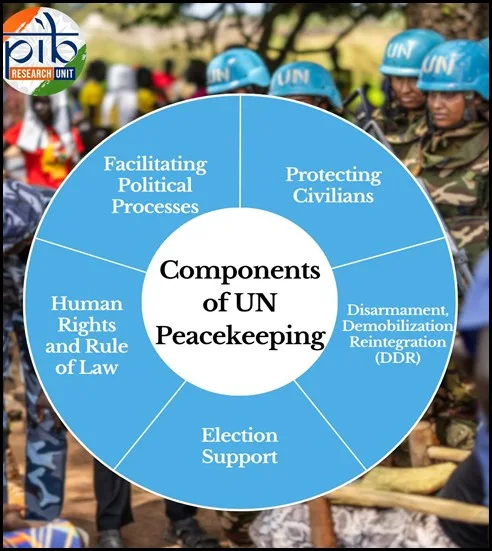Syllabus: GS2/ International Relations
Context
- India actively participates in UN peacekeeping operations, emphasizing dialogue, diplomacy, and cooperation as key pillars of its foreign policy.
What is UN Peacekeeping?
- UN Peacekeeping is a key mechanism used by the United Nations to maintain global peace and security.
- It operates alongside other UN efforts, including conflict prevention, peacemaking, peace enforcement, and peacebuilding.
- The UN Peacekeepers, known as Blue Helmets, get their name from the light blue of the United Nations flag.

History of UN Peacekeeping
- UN Peacekeeping began in 1948 with the establishment of the United Nations Truce Supervision Organization (UNTSO) in the Middle East to monitor ceasefires.
- During the Cold War, missions remained limited due to geopolitical tensions, but the end of the Cold War in the 1990s saw a significant expansion in both the number and scope of peacekeeping operations.
India’s Contribution to UN Peacekeeping
- India’s UN peacekeeping role began with the Korea operation in 1953.
- It has been a key contributor to global peace and security, with over 2,90,000 peacekeepers serving in more than 50 UN missions.
- Currently, over 5,000 Indian peacekeepers are deployed in 9 active missions, working in challenging conditions to promote international peace.
- This commitment stems from India’s ancient principle of “Vasudhaiva Kutumbakam” (the whole world is my family).
Women in Peacekeeping
- In 2022, women made up 7.9% of all uniformed personnel in field missions – up from just 1% in 1993.
- This included 5.9% in military contingents, 14.4% in police forces, and 43% in justice and corrections roles. Among civilian personnel, 30% were women.
- Recognizing the need for greater gender inclusivity, the UN has set ambitious targets under its Uniformed Gender Parity Strategy, aiming for 15% women in military contingents and 25% in police units by 2028.
- Indian Contribution: India pioneered female peacekeeping with deployment of women medical officers to Congo in the 1960s.
- In 2007, India deployed the first-ever all-female Formed Police Unit (FPU) to Liberia.
- As of February 2025, India continues this legacy with over 150 women peacekeepers serving across six critical missions, including those in the Democratic Republic of Congo, South Sudan, Lebanon, Golan Heights, Western Sahara, and Abyei.
Achievements of India
- In 2023, India received the UN’s highest peacekeeping honour, the Dag Hammarskjöld Medal, posthumously awarded to Shishupal Singh and Sanwala Ram Vishnoi and civilian UN worker Shaber Taher Ali.
- Major Radhika Sen has been named the “Military Gender Advocate of the Year 2023” by the UN Headquarters.
- India’s Centre for United Nations Peacekeeping (CUNPK), established by the Indian Army in New Delhi, serves as the nation’s focal point for UN peacekeeping training.
- In February 2025, CUNPK hosted the ‘Conference on Women Peacekeepers from the Global South’ at the Manekshaw Centre in New Delhi.
Concluding remarks
- India’s role in UN peacekeeping reflects its deep commitment to global peace, security, and multilateralism.
- From its early involvement in the Korean War to its ongoing deployments in conflict zones worldwide, India has consistently upheld the principles of the UN Charter.
Source: PIB
Previous article
Gender Gap in the Higher Judiciary
Next article
EAM Visit United Kingdom (UK)